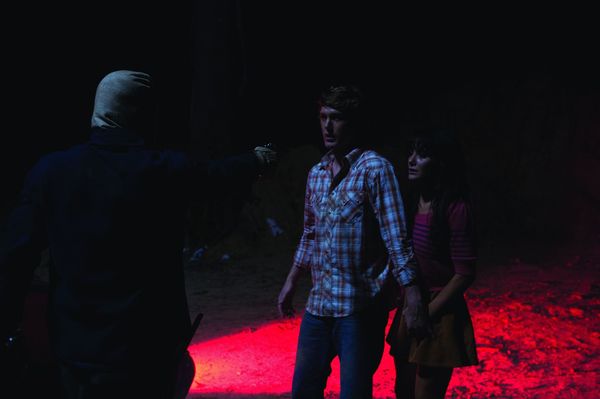Eye For Film >> Movies >> The Town That Dreaded Sundown (2014) Film Review
The Town That Dreaded Sundown
Reviewed by: David Graham

The on-going remake cycle that continues to split viewers while still parting them from their cash has recently begun addressing obscure yet noteworthy flicks that could arguably use an update, as opposed to those that seem sacrilegious to touch. Following groundbreaking psycho-studies like the brilliant Tony Curtis vehicle The Boston Strangler and veiled Ed Gein Southern gothic Deranged, the original Town That Dreaded Sundown channeled Americans' fears in a post-Zodiac, Son Of Sam-beset society into a wildly uneven but memorably intense period police procedural, itself loosely based on the real-life Phantom killer of 1940s Texas. This meta-sequel from several Glee/American Horror Story alumni (director Alfonso Gomez-Rejon makes his cinematic debut, with a script from Glee scribe Roberto Aguirre-Sacasa produced by Ryan Murphy and Jason Blum) is a frequently impressive but occasionally problematic experience; it's perhaps too respectful of its inspiration(s) in some ways and too desperate to seem ultra-modern in others to come together as a satisfying whole.
After Texarkana's annual Halloween screening of local cult hit The Town That Dreaded Sundown, a first date is interrupted by a copycat killer, leaving survivor Jami trying to make sense of her assailant's cryptic message to make the townsfolk remember someone called Mary. As the new Phantom's death toll rises, Jami investigates the original real-life murders that inspired the 1976 movie, while her grandmother questions Charles Pierce's creation's influence upon the whole scenario. As a potential new romance blossoms, Jami realises that the killer's motives may be down to the unsolved and unresolved nature of the crimes, and races against time to discover how the line between the detectives' facts and the film's fiction may have been blurred.

Despite opening strong with its thread of Human Centipede II-style self-referencing and superlative camerawork roving through a retro drive-in setting in all its glory, this new Town struggles to forge an identity of its own. The handsome production values of the original are replicated here but updating the time-frame to today makes them feel somewhat redundant; Wes Craven has already glossed over and soaped up the slasher genre with the Scream saga, so this feels as if it's merely following suit. Pierce's original's faux-reportage voice-over - echoing Deranged's on-screen newsman - is toyed with in a Texas Chainsaw Massacre-riffing spoken word introduction, but heroine Jami's subsequent narration feels unnecessary and often defuses tension while laying on the attempted subtext too thick.
Interspersing the otherwise suspenseful stalk and slash sequences with frames from the original's corresponding scenes may be a neat gimmick on paper, but it often detracts from the moment, especially with such already jarring editing. There have been rumors of studio interference and a slashed run-time - it's actually even shorter than the original - which might explain why the cutting is so flip in a very literal sense. With unnecessarily canted angles around every corner, De Palma-esque dual-focus split-screens and a pirouetting camera that recalls (of all things) Andrzej Zulawski's manic Possession, Gomez-Rejon's attempts to transcend the horror ghetto are admirable but often far too superficial.
There's a sexual charge a la Switchblade Romance to each of the murders that makes this one of the most uncomfortably vicious slashers since Alejandre Aja and Patrick Khalfoun's similarly troublesome and muddled Maniac remake, leering at its victims in a gratuitous fashion (the sound effects alone are wince-inducing) that the likes of Patrick Lussier would undercut with splatstick humour. That there's none of that makes for a tone that flits from agreeably serious to off-puttingly absurd, especially when Gomez-Rejon insists on replaying some of the most tragic and memorable moments from the original with new twists that range from the inspired to the questionable, while the graphic detail of the crimes varies seemingly at random, almost as if he can't be bothered with some of the more derivative kills. A same-sex fumble in particular moves from poignantly intimate and awkward to brutally sadistic with a speed that will catch viewers off-guard, not necessarily in a good way when so little has been done to establish the characters.
The script and performances are a real mixed bag in general - the goofy humor of the original (itself seemingly cribbed from similar but more effective moments in Bob Clark's Black Christmas) isn't exactly missed but many of the characters that return don't register much without it, especially Antony Anderson's 'Lone Wolf' detective and Gary Cole's down-home deputy (surely a case of extreme mis-casting where each actor would be better in the other's shoes). There are at least plenty of genuinely strong female characters, from emotive lead Addison Timlin's proactive Jami (admittedly a carbon copy of Kevin Williamson's Scream heroine Sidney) to Seventies semi-scream queen Veronica Cartwright's logically-minded grandma. The progressive attitude towards the females is apparent in all sorts of little details, such as a homecoming soldier's girl getting ready to pop the question to her hero (a neat throwback to and update of the post-WWII period of the original, even if wartime's context to the killings is never explored here as it was by Pierce). Her post-coital fate however - after another Texas Chainsaw-homaging escape attempt - reminds the viewer that ultimately Aguirre-Sacasa's script is all too happy to retread cliched ground.
It's a pleasure to see recently deceased Lost Boys legend Edward Herrman and The Blair Witch Project's Joshua Leonard as a satirically righteous preacher and a well-meaning beat-cop respectively; their efforts enliven some of the stock situations - the panicked town meeting, the police station debriefing - but as the red herrings pile up and the convoluted motivations get spun out, Gomez-Rejon fails to find a consistent groove despite keeping the kills coming like clockwork. It all ends up disappointingly Scooby Doo with an exposition-heavy climax that severely underwhelms, especially after so many earlier, more simplistic sequences balanced the gore and tension so well (the test screening cut apparently leaves things more abstract in keeping with the spirit of the original - hopefully home video releases will resurrect this denouement).
Ultimately this Town ain't quite big enough to justify both it and the original film's existences; maybe if it had stepped out of Pierce's (and several other film-makers') shadows a bit more it could have been a modern classic, but as it is it's merely another well-made, dubiously-pitched slasher remake that doesn't quite live up to its own potential.
Reviewed on: 06 Apr 2015
















